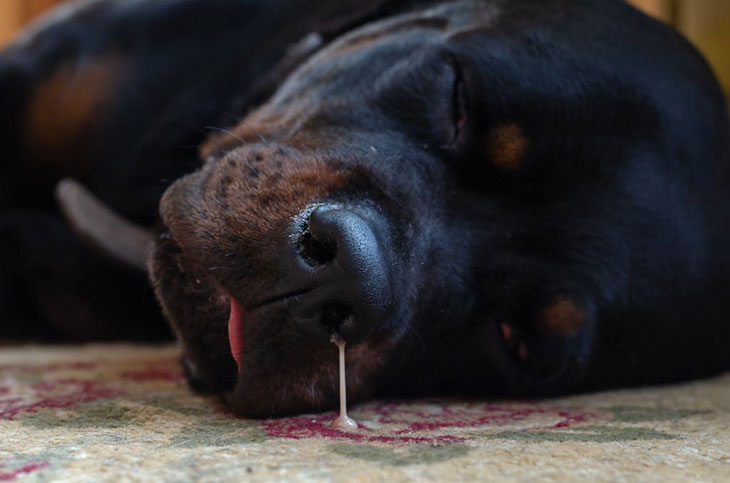Dogs are sniffers possessing an extremely acute sense of smell with 300 million olfactory receptors.
In addition to the unique feeling of scent, the dog’s nose is also highly sensitive to foreign objects and seasonal respiratory diseases.
So, what should I do if my dog has a runny nose and is shaking? By locating the cause of this symptom, you will know what to do next.
This article provides the 11 most common reasons and shares useful information on properly caring for a sick dog at home. Let’s explore together!
Why My Dog Has A Runny Nose And Is Shaking?

Because of the superior sensitivity of the nose, dogs will have a runny nose and shake whenever their nose senses a difference (such as due to cold temperatures, disease, distemper virus, or foreign body).
Depending on the case, it will have other characteristic symptoms.
Refer to the 11 main reasons we have compiled below to know in which case your furry friend is stuck.
Allergies
Allergies are common and usually appear after the dog is about 6 months old. Usually, furry friends suffer from respiratory allergies caused by plant pollen (such as weeds).
Some symptoms of allergies that you need to watch out for:
- Itchy skin and constant scratching
- Weep
- Constant sneezing
If your dog exhibits any of the above symptoms, you should take it to your veterinarian for a blood test.
After receiving the conclusive results, you can discover the cause of the allergy and rearrange the dog’s habitat.
Combine that with your veterinarian’s prescription antihistamines, and never apply human medication to your dog.
Flu
Although the types of flu are extremely diverse, fortunately, none are severe enough to cause death.
However, this weather disease is never pleasant when combined with the following respiratory symptoms:
- Anorexia
- Tired, indifferent to everything
- Cough and runny nose
- Fever, hot body temperature
Because of its contagion, an infected dog can similarly put all pets it comes in contact with. Once you find out your dog has the flu, you must immediately isolate it from other house members.
This disease disappears very quickly if the dog receives rest and timely care.
But if the condition has become severe (the dog’s nose is starting to discharge), it will need treatment with prescribed medications, anti-inflammatory drugs, IVs, and antibiotics.
Infection
Pus or mucus draining from your dog’s nose is a hallmark sign of bacterial infections. You can also recognize this bacterial and viral disease through the accompanying symptoms below:
- Unpleasant smell
- Epistaxis
- Reverse sneezing
- Dog coughing and shaking
You must give your pet antifungal drugs and antibiotics prescribed by your veterinarian. In cases of chronic infection, surgery is the only option.
Kennel Cough
This infectious tracheobronchitis disease is extremely contagious while causing adverse effects on the host’s trachea.
Symptoms of a Kennel cough include uncontrollable cough, dry cough, and runny nose.
Your furry friend should be vaccinated against kennel cough from an early age. Infected dogs will need a combination of cough suppressants, pain relievers, and antibiotics.
Distemper
Although quite rare, canine distemper can still occur in puppies not fully vaccinated.
If your four-legged friend is showing symptoms similar to the cold below, it is such an emergency situation that you should take it to the nearest veterinary facility as soon as possible:
- Vomiting
- Diarrhea
- Sneezing, runny nose, and eyes
- Fever
The dog can be completely healthy after a few weeks with timely treatment. But in some less fortunate cases, your pet is at risk of death because the disease has become severe.
Polyps/Tumor
Although nasal neoplasms account for only 1-2% of all tumors, almost all are malignancies. They are more concentrated in dogs older than 10, especially male dogs.
Increased nasal cavity density leads to the narrowing of the airways, leading to an uncontrollable runny nose in pets with the following symptoms:
- Mucus begins to flow from one nostril, then both sides
- Face deformity
- Constant sneezing
Dogs not treated can only live with the tumor for 3 to 5 months.
If detected in time, the veterinarian will apply chemotherapy, surgical removal of the tumor, or radiation therapy to treat your hairy friend.
Nasal Mites
Nasal ticks can be spread directly (from dog to dog) or indirectly (through an intermediary). Typical symptoms include:
- Sneezing, runny nose, and head shaking
- Epistaxis
- Wheeze
- Itchy
Unfortunately, no specific medications are approved for treating a particular type of tick/lice.
Your doctor usually uses empiric therapies, such as milbemycin oxime and ivermectin.
Genetics
Certain short-nosed dogs (such as Boxers, French Bulls, Pugs, Shih Tzus, Bull Terriers, etc.) are genetically predisposed to a runny nose.
You do not need to worry too much when flat-faced dogs have runny noses.
However, this health issue makes dogs prone to narrow nostrils, mouth fistulas, and cleft palates, which require surgical intervention by a veterinarian to correct.
Nostril Problems
The short head syndrome often occurs in short-faced dogs, such as the English Bulldog, Pug, and Frenchie. Symptoms that you should consider include:
- Bad breath, noisy breathing, snorting
- Fatigue, fainting
- Loud snoring
You must control their exercise level and install a good air conditioner for patients with mild symptoms.
Overweight dogs need to follow a diet. Once the common symptoms become more severe, your hairy friend may require surgery.
Body Temperature Problem
Since dogs are not very good at controlling their normal body temperature, they sometimes sneeze while trying to stay cool.
This symptom is more common in hot weather after the dog exercises and is panting. Ensure it rests in a cool place, drink plenty of water, and the dog will return to normal.
Something’s Stuck In Its Nose
Dogs are curious about the world around them and sniff out everything in sight.
Foreign objects (such as Lego pieces, grass, and leaves) can become blocked in the nostrils, causing the following flu symptoms:
- Vomiting
- Nosebleed
- Use your front paw to scratch your nose
- Sneezing
It would help if you let the dog breathe into a mirror to check when you suspect a blocked nose. Steam from the uneven nostrils will tell you which nostril is blocked.
Use sterilized hands or tweezers to remove the foreign body from your furry friend’s nose. If you are unable to do that, contact your veterinarian immediately.
What Can I Give My Dog For A Runny Nose At Home?

The cold season is coming, and any dog is at risk of catching the flu.
Closing the door all day accidentally causes bacteria to get trapped inside, creating conditions for pets to catch colds and runny noses.
If your dog shows these common signs, don’t worry.
In addition to the prescription given by the veterinarian, ensure the following conditions to improve your furry friend’s health condition.
A Clean Environment
It would help to clean your dog’s daily supplies and shelter, including toys, food dishes, and blankets.
Changing water and food daily (even if you have leftovers) will help limit harmful bacteria and germs around your furry friend.
Although the flu in dogs is not contagious to humans, it is very contagious to other dogs. It is not the right time to let your dog walk outside.
Besides, allow your dog to get more rest and walk around your area while still maintaining a distance from other pets.
A Humidifier
Similar to humans, the respiratory system of these four-legged friends also gets better when the air becomes steamy and warm.
Therefore, you should consider a warmer and place it in the dog’s room. Keeping the puppy in the sauna is a fairly economical and effective alternative.
Plenty Of Fluids
Once the dog retains water, its nasal secretions will become thinner, making breathing easier. Give your dog alcohol, vegetables, brown rice, and chicken soup (low sodium).
Nutrition Diet
Nutritious meals that help your dog recover faster, such as brown rice and chicken.
If the dog doesn’t seem to like these healthy treats, the dog’s sense of smell has likely decreased due to illness.
Put the food in the microwave, and the scent strengthens, helping the dog be more interested.
FAQs

Why Is My Dog Sneezing A Lot And Shaking?
Dogs sneezing and shaking constantly are mainly caused by nasal mites, foreign bodies, and respiratory diseases, especially tumors in the nose.
If this bad condition is persistent with a runny nose, it’s best to seek veterinary care for your furry friend as soon as possible.
Do Dogs Shake When They Are Sick?
That’s right! Just like humans, dogs also tremble when they feel unwell.
Some additional signs of a sick dog that you should look for include constant swallowing, nausea, drooling, and lip licking.
How Long Do Dog Colds Last?
Pet flu symptoms usually last between 5 and 10 days. However, this cold can end sooner if you detect and care for your furry friend in time.
Some Last Words
When the weather turns cold, taking extra care of your four-legged friend is key to keeping your dog healthy.
If your dog is sick, you must contact your veterinarian and provide a clean living environment to facilitate their recovery.
So, what should I do if my dog has a runny nose and is shaking? We hope you are satisfied with the answer and all the information related to this topic. Good luck!
